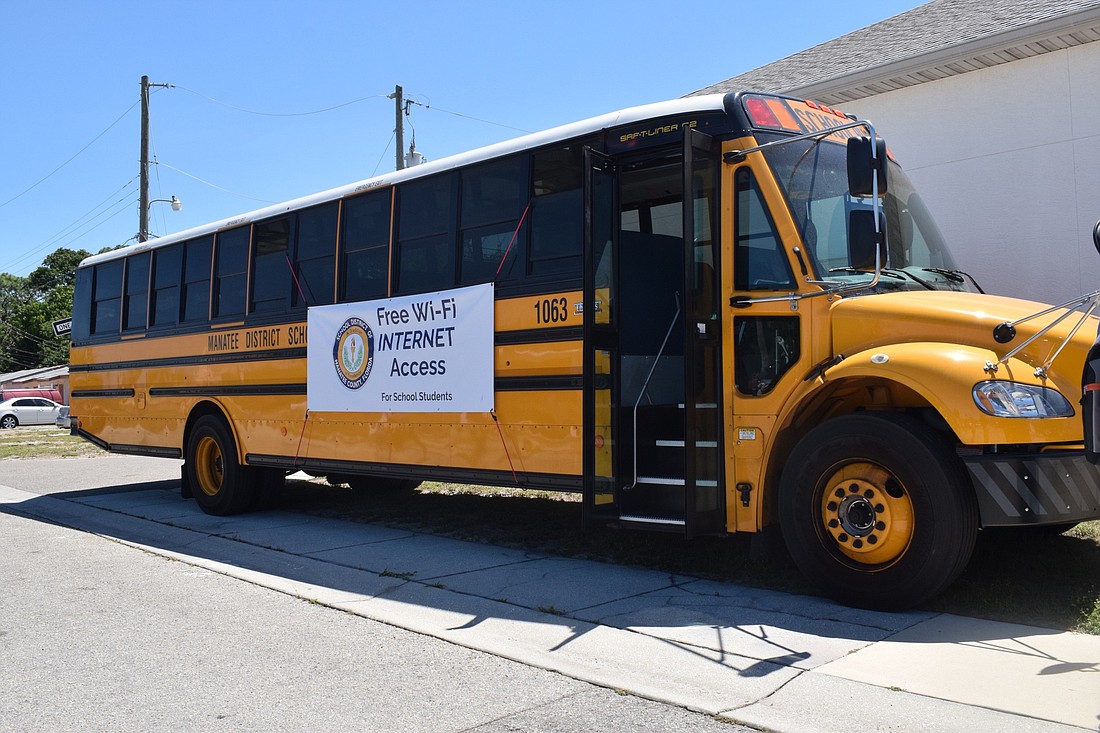- April 23, 2024
-
-
Loading

Loading

School District of Manatee County buses are hitting the streets again, but they’re not filled with students.
Instead, 18 buses have been turned into Wi-Fi hot spots that will be parked at community centers and churches across the county to provide internet to students who don’t have access at home as they continue their online learning.
As of April 1, the district had distributed about 9,000 devices to families throughout the county, but Wi-Fi remained an issue.
“Having a device with no internet connectivity really doesn’t do any good if you’re on an online platform,” said Cynthia Saunders, the School District of Manatee County superintendent.
Online learning began March 30 as a result of the schools being closed due to the COVID-19 pandemic.
When the district started developing its plans for online learning, Scott Hansen, the district’s chief technology officer, said the district ordered 400 hot spots but had received more than 800 hot spot requests from families.
James Golden, school board member, reached out to faith leaders throughout the county to see if they would be interested in having their church serve as a spot for the buses to park.
“We want to ensure the children have the ability to experience as much of a classroom environment as they can without being in a classroom,” Golden said.
Saunders said bus locations were then chosen in highly populated areas, so students could go to the church or community center to do their work as would students living in homes surrounding the parked bus.
“It has been a community effort with a lot of minds and a lot of support, and we’re very fortunate to live in a community where so many people want to see our students be successful and to help in any way,” Saunders said.
Wi-Fi signals on the buses can reach up to 1,000 feet depending on the number of users and what the users are doing.
District technicians will be on-site to help students, and students will need a password to access the Wi-Fi.
Each bus will have two drivers with it to help the district to keep its employees working.
The district’s transportation department was able to install the first 18 buses within a weekend.
Seven buses were sent out to locations March 31, and 18 were sent out April 1. The district is prepared to have up to 50 buses be used as hot spots. The Wi-Fi equipment costs $2,000 per bus.
Forty churches have offered their facilities as a place for the buses to park. Risen Savior Lutheran Church and Oasis Church in Lakewood Ranch are among the churches that have volunteered to have a bus parked at their churches.
Two buses are at Falkner Farms in Myakka, where about 200 students will be using the buses’ Wi-Fi.
“We’re changing whenever we see the need and making adjustments as we go along,” Saunders said.
Although the primary use for the buses is online learning, Hansen said it will provide several new opportunities.
“This is an investment that we’ll be able to leverage for our school district beyond this COVID-19 challenge,” Hansen said. “So many opportunities will be created moving forward as we work through this and expand on those capacities and challenges.”
For example, the buses can be used when sports teams travel to games, so students will be able to work on assignments while on the bus rather than waiting until they are home.